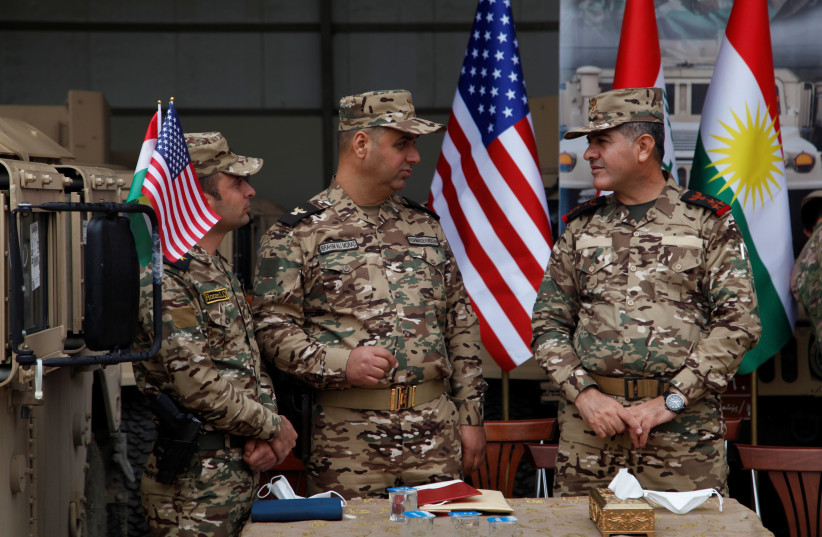On August 24 the US military announced that US Army Maj.-Gen. Joel ‘JB’ Vowell had assumed command of the anti-ISIS operation known as Operation Inherent Resolve.
The military coalition to defeat ISIS completed a transfer of authority ceremony in Baghdad, Iraq, last Tuesday, according to the US.
Vowell assumed command from outgoing commander Maj.-Gen. Matthew McFarlane. US CENTCOM head General Michael Kurilla attended the important event.
“Your leadership during this period of complex challenges and changes was nothing short of remarkable. [You] managed more risk on a day to day basis than any commander in the joint force around the world,” Kurilla said.
“We live on the knife’s edge of freedom. Our mission here is to continue the defeat of Daesh, help our partner forces get better, and become independent. That will be my focus,” Vowell said, according to the coalition. “As the capabilities of the coalition’s partner forces continue to mature, CJTF-OIR will focus on advising, assisting and enabling them in ensuring the defeat of Daesh and building foundations to maintain stability in the region,” the coalition said.

Uniting Kurdish Peshmerga forces
Last week the president of the autonomous Kurdistan Region in Iraq, Nechirvan Barzani, met with US Maj.-Gen. Matthew W. McFarlane to discuss challenges facing the region. The Kurdistan region has its own armed forces called Peshmerga.
Peshmerga reform has been important to the Kurdistan region as well as to the US and other Western countries which back the Kurdistan regional government. According to a statement posted online, the two discussed the challenges of the Peshmerga reform process.
According to Rudaw media in Erbil, the outgoing commander of the coalition said that the absence of someone holding the office of minister of Peshmerga in Erbil has stalled efforts at reform.
The Peshmerga have historically been linked to the two large Kurdish political parties, the KDP and PUK, a link that goes back to the history of the Kurds and their struggle for independence and also their resistance against the Saddam regime.
Currently, a ministry of Peshmerga is supposed to help unify the Peshmerga and reduce the units reliance on political connections. This has been an ongoing process for more than a decade. The Peshmerga played a key role in the war on ISIS.
Efforts to unify them stalled in part due to the war and were also harmed by the 2017 crisis when Iraq’s federal forces and Iranian-backed proxies attacked Kurds in Kirkuk and Sinjar. Today there are hopes that the Peshmerga will see progress.
Rudaw noted that “Peshmerga Minister Shoresh Ismail, submitted his resignation from the position late last year citing constant meddling of political parties in the ministry’s affairs. He is no longer filling the role even though his resignation has not yet been officially accepted by the Council of Ministers.”
The report also said the outgoing US commander had expressed disappointment at lack of progress on some aspects of a Memorandum of Understanding (MoU) signed between the US Department of Defense and the Ministry of Peshmerga Affairs in September last year.
“The MoU highlights Washington’s commitment to supporting the Peshmerga forces in the fight against the Islamic State (ISIS), and the Peshmerga ministry’s commitment to advance the professionalization of its forces and undertake institutional reforms, including the unification of the forces,” the report said.
“The most recent review identified that the Ministry of Peshmerga Affairs has made some progress on the implementation of the MoU milestones, but the absence of a Ministry of Peshmerga Affairs minister has weakened the institution and stalled progress on efforts to unify and professionalize the force,” McFarlane told reporters in Erbil.
Vowell has played a key role for US forces in Asia over the last several years. Since the summer of 2021 Vowell was commander of the US Army in Japan. He has made important statements about the role of China over the last years. He comes into a command that has successfully defeated ISIS and is now helping to assist forces such as the Peshmerga, the Iraqis as well as the Syrian Democratic Forces to keep ISIS defeated.
The US continues to carry out operations in Syria. US forces generally have reduced overall operations and their overall numbers in Iraq and Syria over the last four years since ISIS was largely defeated in 2019. Nevertheless the US plays an important role in Iraq and Syria and also in stabilizing the important region that stretches from eastern Syria to northern Iraq.
These regions have large Kurdish minorities, and the Kurds have played a key role in defeating ISIS but they face challenges in Syria and Iraq.
In Syria the SDF are confronted by Turkey’s hostility. Turkey attacked the SDF in 2019 and carried out drone strikes, including attacking SDF commanders who work closely with the US.
The Iranians also operate in Syria along the Euphrates river valley and threaten the SDF and US forces. The Russians also operate in Syria. This means the SDF, backed by the US, must deal with the complexities of operating in Syria against ISIS while also facing opposition from Iran and Turkey, and a complex relationship with Russia.
Russia has increased harassment of US forces in Syria and the US sent F-22s to the region to deter Russia.
The US also seeks to deter Iran. Iran has backed proxies in Iraq and Syria to attack US forces. The US also has a garrison at Tanf, a lonely outpost in Syria near the Iraq-Jordanian border.
